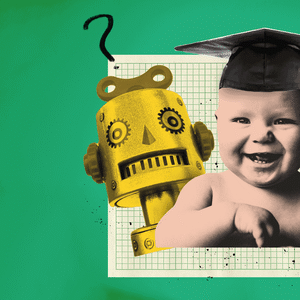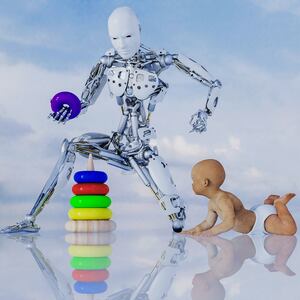It’s a rite of passage for parents: hearing your newborn crying through the baby monitor randomly throughout the night, forcing you to wake up, get out of bed, and figure out what heck they need at 3 a.m. anyway. It could be as obvious as a diaper change—but often, it’s not. They might be hungry, colicky, or they just want to cry.
That might be enough to trigger flashbacks for some parents. The vast majority of new parents lose an average of three hours of sleep a night in the first year of their baby’s life, according to a survey conducted by U.K. baby furniture company Snuz. This often leads to sleep deprivation—which can result in harmful effects to the parents’ physical and mental health.
When it comes to caring for their child, though, there might be a technological solution to being able to both make their baby happy and catch more sleep: artificial intelligence. In the past few years—especially since the advent of OpenAI’s ChatGPT—researchers and tech companies have been honing in on AI hardware and software that can help take the guesswork out of caring for their children.
“The first two and three years of your life really support who you become as an adult,” Appolline Deroche told The Daily Beast. “That period is so important in your child’s life.”

A crib mounted with a faux cell phone that could be running Cappella's app. When the baby cries, the app automatically lets the parent know and gives them insight into why they’re crying.
Tony Ho TranDeroche is the founder and CEO of Cappella, a baby monitoring software that uses AI to translate a baby’s cries. Using just an app on a repurposed iPhone mounted on the baby’s crib, parents can monitor their newborn as they sleep. When the baby cries, the app automatically lets the parent know and gives them insight into why they’re crying.
So it might tell them that their child is hungry, tired, or they need their diaper changed based on the sound of their baby’s crying. The parent can then come in, help their kid based on what the app told them, and then—ideally—get right back to sleep themselves.
“We always hear [from parents], ‘I would do anything to get an extra hour of sleep. And lack of sleep is linked to postpartum depression,” Deroche said. She later added, “This also just gives parents peace of mind.”
The Language of Crying
Despite the mystery for parents, there’s actually quite a lot of research behind baby cries. Though it may be a bit of cold comfort, crying babies are actually a good sign of healthy development.
One study published in the journal Current Biology in 2022 also found that parents of young children are able to decipher baby cries better than adults. So there is something to the idea of being able to “translate” a baby’s crying. That’s why Deroche decided to turn to AI in order to see if it could help streamline the translation process.
“I wanted to make this really, really good and really accurate. So I knew I had to go to hospitals,” Deroche said. She explained how Cappella currently partners with two hospitals with maternity wards, where her team records the sounds of babies crying for their AI’s training data.
Of course, a collection of noises doesn’t mean much without context. That’s why she also works with the doctors who label and annotate the crying based on what the baby is trying to “say.” “The doctors help make sure that ‘This is a hunger cry’ or ‘This is a pain cry’ before we feed it to our algorithm,” she explained. “We have a very rigorous clinical trial process.”
Deroche added that their technology is universal too. This allows parents from all over the world to leverage the app so long as they have an iPhone. “When you’re born, no matter if you’re a French baby, an American baby, a Chinese baby, we all have the same reflexes in our throat and in our tongue to express different things—so it’s really universal,” she said.
However, there is scientific evidence and research to suggest it’s not that simple. In a 2009 study published in Current Biology, researchers in Germany found that there were distinct differences in the cries of German and French babies. The authors suspect that these slight differences in inflection and tone are due to the newborns actually picking up on their parents’ languages in-utero.
Deroche acknowledges that their technology is somewhat limited—and has a shelf life of six months. After that, she said that the parents are “a lot better at understanding and communicating” with their baby. The newborn also begins to adopt the language culture of their parents and surroundings as well, making it much more difficult to translate for the AI.
“After that, you can just use our app as a regular baby monitor,” she added.
Automated Babysitter
Jason Lowe is less concerned about translating babies than he is about saving their lives.
Lowe is the CEO and founder of Chill Baby Technologies, a startup that offers a suite of AI-supported baby safety systems including a car seat that monitors temperature and alerts parents when it's unbuckled, and a climate-controlled stroller that automatically purifies the air around the baby when in polluted areas.
Lowe recently helped unveil the company’s newest product at the 2024 Consumer Electronics Show: Cammy, an AI high chair camera. The device keeps an eye on your child as they sit and eat in their high chair, and can help warn parents if their child is having an allergic reaction to food, track their eating habits, and also alert them if their baby is choking.
“The choking detection is a safety alert,” Lowe told The Daily Beast. “You hope you never get that alert, but you know it’s there in case anything should happen.”

A display showing Chill Baby Tech's Cammy software that warns parents if their child is choking.
Tony Ho TranThe app also helps walk parents through what happens if their child is choking. Lowe said that this provides an additional layer of safety for parents’ peace of mind.
Of course, it should go without saying that parents shouldn’t solely rely on AI in order to ensure their baby’s safety and well-being. While these technologies can help support tired and overworked parents, they’re no replacement to the actual hands-on care a parent can provide for their newborns.
Still, both Lowe and Deroche are helping spearhead an uncharted, AI-infused future of childcare—one that has experts concerned about the development and health of children. As Deroche said, the first two years of a child’s life are vital. Research shows that the vast majority of brain development occurs during this time. It’s crucial, then, that children get as much exposure to their parents—and actual humans—as much as possible during this time.
That’s the reason why some child development experts are concerned about the rapid intrusion of AI into child rearing. “New technologies can shape the architecture of our brains,” Dana Suskind, co-director of the TMW Center for Early Learning and Public Health, wrote in The Wall Street Journal. She added that an over-reliance on emerging AI means that we “risk disrupting our own evolutionary fabric.”
But when it comes to babies, most parents want to use all the tools at their disposal to make sure that they’re happy and healthy. It doesn’t matter if it’s an app that monitors their kid while they’re sleeping, or a purifier pumping clean air into their stroller. After all, it may make their child happier and even save their lives—or, at the very least, let the parents catch up on an hour or two of sleep.








